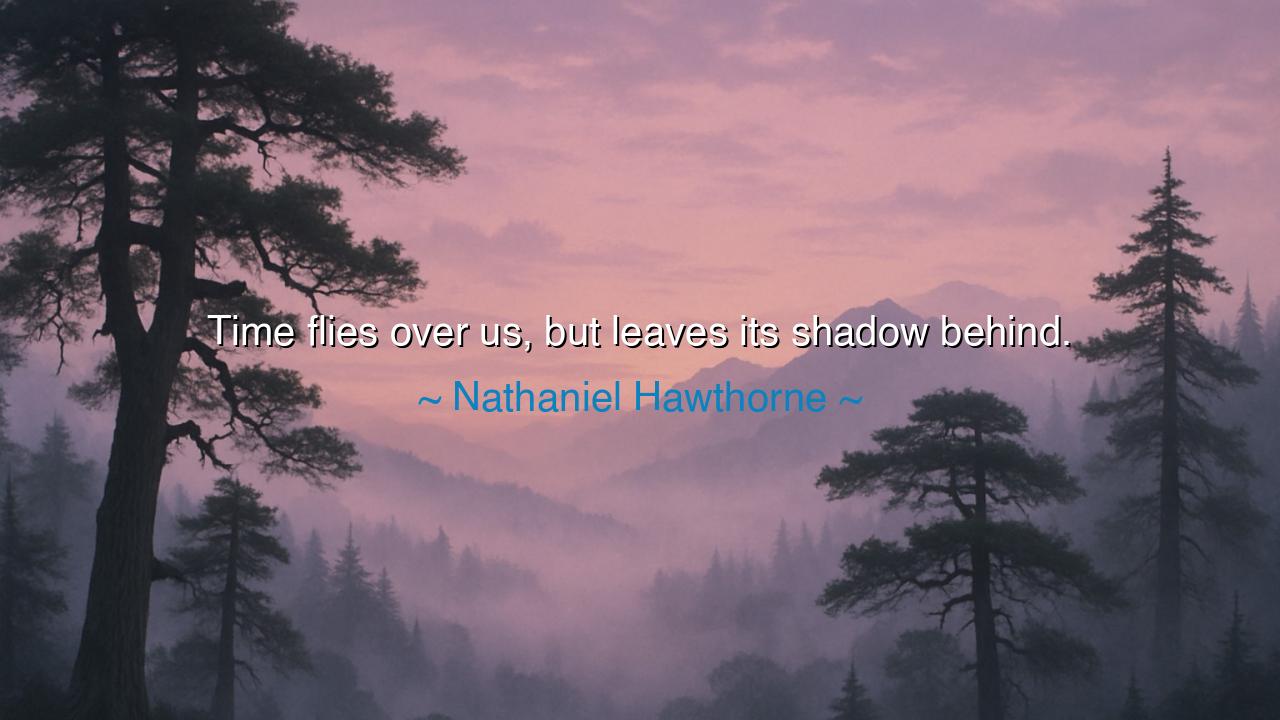
Time flies over us, but leaves its shadow behind.






Hear, O seekers of wisdom, the solemn words of Nathaniel Hawthorne: “Time flies over us, but leaves its shadow behind.” In this saying lies a truth both haunting and beautiful. For time, swift as a bird in flight, passes over our heads, never pausing, never lingering, never to be captured again. Yet though its wings are gone, it leaves its shadow—the mark of memory, the imprint of deeds, the trace of all we have lived. The moments themselves vanish, but their echoes remain, shaping who we are and what we become.
The origin of these words rests in Hawthorne’s deep meditations on history, morality, and the soul. A man steeped in the shadows of Puritan heritage, he knew well how the past never truly dies. In his writings, he often depicted how guilt, memory, and legacy haunt the present. Thus, his reflection is both poetic and moral: time may pass beyond our grasp, but what it leaves behind—the choices we make, the memories we carry, the shadows cast upon our hearts—remain with us always.
Consider the story of Abraham Lincoln. The days of his presidency rushed by amid the storm of civil war, each moment filled with decisions heavy with consequence. Time flew swiftly over him, and he did not live to see the full fruits of his labor. Yet the shadow of those fleeting years remains. His words, his sacrifices, his leadership continue to shape the American spirit long after the man himself was carried away by the current of time. The shadow left behind has become a light for generations.
So too in the realm of personal life. A child grows swiftly before the eyes of their parents; the years of laughter and innocence pass almost unnoticed until they are gone. But the shadow of those years—memories of love, lessons imparted, bonds unbroken—remains long after the days themselves are past. Thus Hawthorne reminds us: though time cannot be held, it does not leave us empty-handed. What it takes in moments, it returns in remembrance.
Yet this shadow is not always gentle. For those who sow injustice, cruelty, or neglect, time also leaves its dark marks. Empires that enslaved, rulers who oppressed, men and women who betrayed—though their days have ended, the shadow of their deeds lingers, haunting history, demanding reckoning. The swift flight of time may erase the actors, but never the consequences of their choices. In this truth lies both warning and wisdom: our actions, though fleeting in the moment, cast shadows that endure.
The lesson is clear: live each moment with care, for though time flies beyond your reach, its shadow will remain. Fill your days with kindness, with courage, with integrity, and the shadow you leave will be a legacy of light. But if you fill them with vanity, with cruelty, with neglect, then the shadow will be heavy, a burden upon your name and upon those who remember you. Hawthorne teaches us to live not for the fleeting hour, but for the enduring shadow it leaves behind.
Practical counsel follows. Reflect often on the mark your days are leaving. Do not waste your hours in idleness, for though they pass quickly, their emptiness will echo. Seek instead to act with purpose. Keep a journal, speak words of love to those dear to you, build works of service for your community. Each choice becomes part of the shadow that follows you, part of the memory you leave to others. Let your shadow be one of honor, not regret.
So let Hawthorne’s words echo in your heart: “Time flies over us, but leaves its shadow behind.” Take them as both warning and comfort. For though you cannot stop the swift flight of days, you can shape the shadow they leave. Live, then, in such a way that when time has flown, its shadow will be a blessing, not only upon you, but upon all who walk in its shade.






AAdministratorAdministrator
Welcome, honored guests. Please leave a comment, we will respond soon